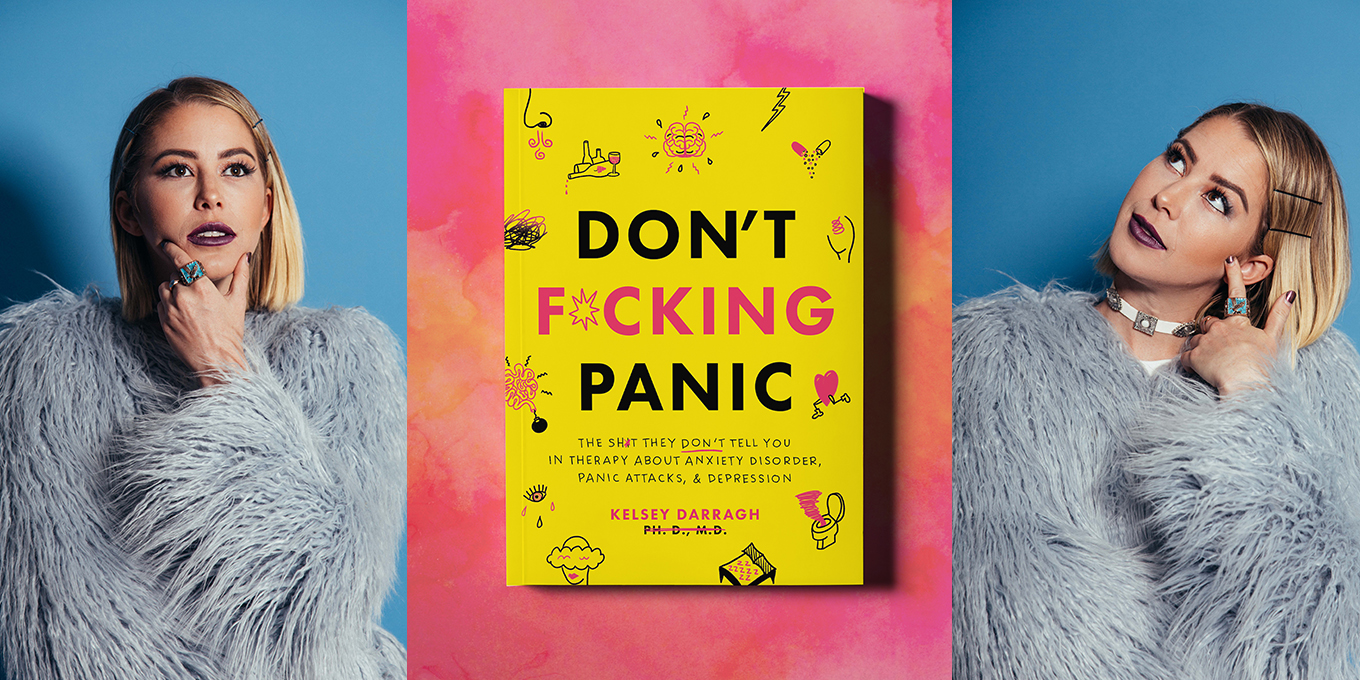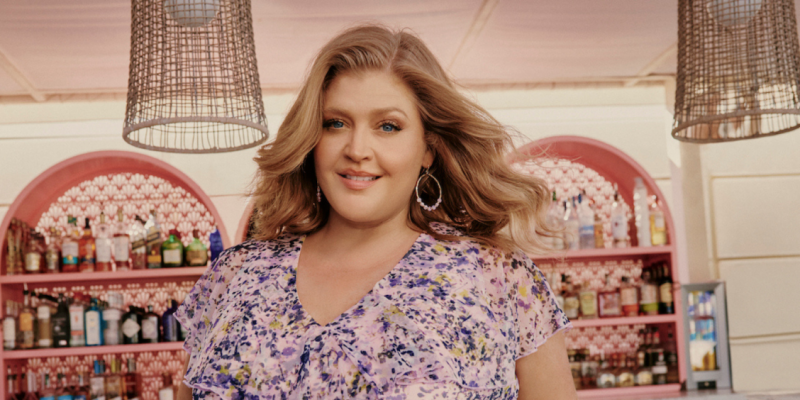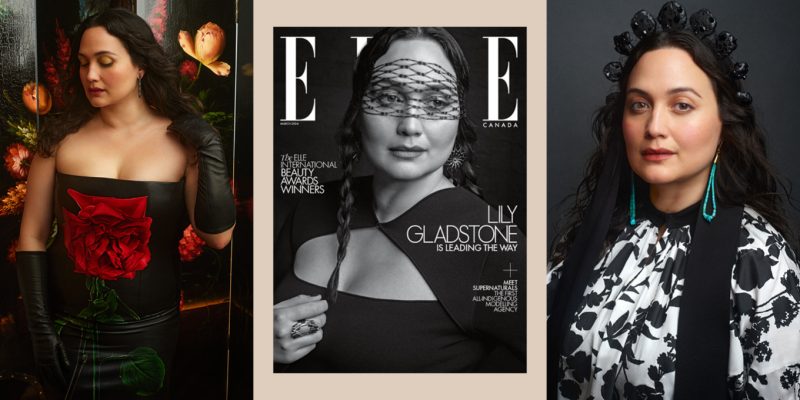Culture
Writer Kelsey Darragh Wants You to Take a Minute to Check in on Yourself
Internet personality Kelsey Darragh’s new book, Don’t F*cking Panic, is an enlightening and empowering tool to help you manage your mental health as the world experiences collective trauma.
by : Patricia Karounos- Jan 19th, 2021

Jack Dytrych Photographer (@jacktdphoto)
Every once in a while, if we’re lucky, we hear something that forever changes the way we think. For comedian, writer and internet personality Kelsey Darragh, who has earned a devoted following thanks to her refreshing candour about living with mental illness and chronic pain, such an instance came from her therapist. “I’ve always been pretty open thanks to comedy, but I often hid the most painful parts of myself because I was so scared of being judged. I was afraid of people saying, ‘There’s no way this is real, she’s just doing it for attention,” she tells us over the phone from L.A. “But then my therapist said: ‘If you’re suffering, why wouldn’t you want attention?’ And that blew my mind – not because I want sympathy, but because I want to create change.”
And if you’re familiar with Darragh at all – she made a name for herself making and starring in BuzzFeed videos, and now, among other things, hosts the popular podcast Confidently Insecure – you know that’s exactly what she’s trying to do. Her latest venture is the recently released, Don’t F*cking Panic, a raw, completely honest and timely guidebook full of useful tips, tricks and exercises (all of which Darragh has used herself) to help manage anxiety and depression. We caught up with Darragh to chat about the book and find out how she takes care of her own mental health.
 Jack Dytrych Photographer (@jacktdphoto)
Jack Dytrych Photographer (@jacktdphoto)What was your impetus to write the book?
Since I was a teen, I’ve been struggling with anxiety, debilitating panic attacks and depression. I noticed is that, thanks to internet culture, people started talking about their mental health struggles more openly, and often in a very self-deprecating, humorous way. On the flip side, I was looking for actual medical and clinical help, but everything was so science – the books and articles I found were also mechanical and I didn’t understand any of the language. Our generation is cool enough to accept that mental illness is real and we want to do something about it. But every person’s mental health journey is different, so I really wanted to make a book that included every tip and trick I have learned and that turned into a funny and relatable workbook. The book has my own personal experiences, but also exercises so that you can pick it up whenever you’re struggling and use it as a guide.
The idea of a workbook is really unique. You, of course, make it clear that you’re not a doctor throughout. Why frame the book this way instead of just writing a classic memoir based on your experiences?
Not being a doctor is precisely the point. I want readers to know that I have lived through this, I am still living through it and that I will likely live with it for the rest of my life. The book is meant to bring a community together outside of the medical field. When I am going through the worst bouts of panic, I would do anything to be distracted. I wanted to create something interactive. For example, in the panic section, there is a page where the words are very big and bold, talking you through line by line to lowering your panic attack. This is not just for entertainment. It really is a guide with its own kind of soul.
“There is some science as to why masturbation helps during a panic attack: Panic attack symptoms mimic the same symptoms of an orgasm, like a rising heart rate, shortness of breath, sweat.”
What tip works best for you when you’re feeling panicked?
I’m so glad you asked. My favourite answer to this question is masturbation, which people think I’m joking when I say it. But there is some science as to why it helps during a panic attack: Panic attack symptoms mimic the same symptoms of an orgasm, like a rising heart rate, shortness of breath, sweat. And, of course, there’s the science of what your body releases chemically when you have an orgasm. So that’s all stuff that’s going to make you feel good and feel happy, so it’s my fun go-to, when I can.
What are your tips for being online and taking care of your mental health?
It really is all about balance. I also deal with chronic pain in my life, so if I notice that everything starts to hurt because I’ve been sitting on my couch going through TikTok for four hours, I kind of start feeling bad about myself and my self-image. Our media is still skewed to make us feel bad about ourselves. So number one is taking back power in the way you view your own media. That’s really important. And knowing when to take a break — it’s all about awareness. And then don’t judge yourself. Don’t feel bad that you spent four hours on TikTok. Just recognize it and realize, “Oh yeah, that’s what it’s meant to do and I feel for it.” [Don’t act] out on self-judgment.
“If I am feeling good, it’s about being there and listening. But no one has it together all the time. No one can always be readily available to be the person with answers.”
Because you’re so open, you must have people turning to you all the time for guidance. How do you navigate that, especially in instances where maybe you want to help, but feel like you’re struggling with your mental health?
This is a more relatable experience than people understand. If I am feeling good, it’s about being there and listening. But no one has it together all the time. No one can always be readily available to be the person with answers. Step one for me is asserting boundaries. Tell people you don’t have emotional space right now. Or say something like, “I would love to come back to this, but can you hang on until I get my own thoughts together?”
In the book, I actually reach out to the people I call my three musketeers: my mom, my sister and my best friend. I asked them what they did for me when helping me through my shittiest panic attacks – like what advice can my A-Team give to the audience? And all three of them said it’s about asking the person how you can help them, or what they need, and just being there for them. Sometimes you just have to sit with them and let them vent without saying anything. It’s never about trying to fix them, and that’s important to know. You’re never going to be able to fix someone, you can just offer support and guidance.
What do you hope people take away from the book?
I put things into this book that complete my outlook on how I view my own mental illness. I hope everyone experiences something similar, where they read even just one thing that sticks with them forever. And then the next time they’re going through something hard, they remember it, or they share it with a friend. I want people to feel like their lives are more manageable, and that they too can help other people. The beautiful part of this is that I really do feel like the universe made me go through the worst suffering of my life thus far so that I can become a resource for others. And when I look at it that way, I’m kind of like, “Let’s do this.”
Kelsey’s Advice Corner
Three helpful tips from Don’t F*cking Panic
No 1. MAKE A TRIGGER LIST
It’s scary when an anxiety attack comes out of nowhere. Try to take stock of the specific daily stressors – think from something as simple as your caffeine intake to bigger things like conversations about money or seeing a certain family member – that can trigger an anxiety flare up. This will help you better prepare for them so you can manage the anxiety symptoms better.
No 2. MAKE AN EXIT PLAN
Is there an upcoming event or something happening in your life that’s making you feel anxious? Craft an exit plan, which will “tell your brain that you are safe and never physically or mentally ‘stuck’ in any scenario.” This way, you are giving yourself agency over that anxiety-inducing situation and have a backup plan just in case you need it. But be sure to stick to practical scenarios and plans only – getting caught up in “what-ifs” can lead you down a different rabbit hole.
No 3. TURN OFF NOTIFICATIONS
Get caught up doing too much doomscrolling? Do you find your anxiety spiking every time an email comes in or another overwhelming news story breaks? Limit the number of push alert notifications you receive, or turn them off from time to time to give yourself a moment to catch your breath. The news will still be there when you’re ready to turn them back on. Darragh also suggests checking your phone settings to see how often you pick up your phone and which apps you click on. Seeing the number plainly written out will likely be shocking and help change your relationship with your device.
Newsletter
Join our mailing list for the latest and biggest in fashion trends, beauty, culture and celebrity.
Read Next

Beauty
Dyson Just Launched Its Most Intelligent Hair Dryer Yet
Get ready to upgrade your blowout game.
by : Lauren Knowles- Apr 25th, 2024

Fashion
Meredith Shaw Created a Plus-Size Summer Dress Collection That "Feels Like Candy"
The morning show host joined forces with PENN. to create a curated collection for sizes 14-32.
by : Allie Turner- Apr 25th, 2024

Beauty
ELLE Tried It: Five Serums to Up Your Skincare Game
Members of the ELLE team tested Avène Dermatological Laboratories’ five new concentrated serums. Here's what they thought.
by : ELLE Canada- Apr 25th, 2024




